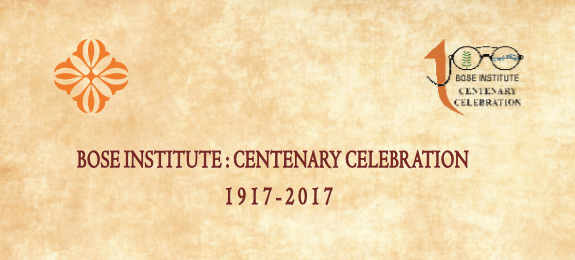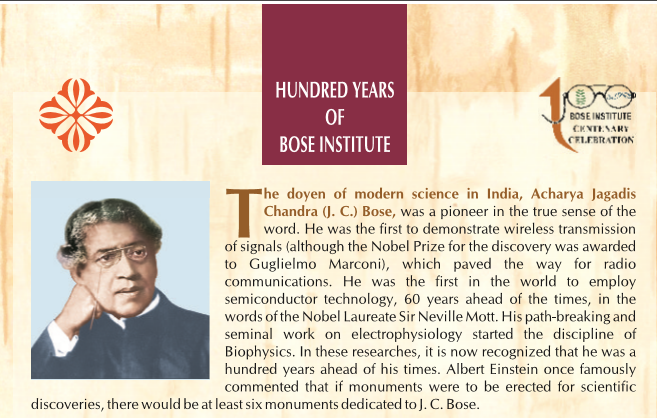Centenary
Acharya Sir Jagadish Chandra Bose and Hundred Years of Bose Institute
Acharya Sir Jagadish Chandra Bose is the first modern Indian scientist who pioneered breakthroughs in radio communication, semiconductor devices and plant electrophysiology. His demonstration of wireless millimeter wave propagation in Calcutta in 1895, a first in the world, was a major achievement that led to the foundation for the development of modern wireless communication from radio to satellite communication. The demonstration was possible only because of his ingenious fabrication of a number of novel devices associated with wave generation, propagation and detection. In the process, he designed the earliest waveguide and Horn Antenna — an integral part of the present day microwave engineering. His Galena detector was the first semiconductor device in the world, as was his prototype of an early Photovoltaic cell. His experiments often provided glimpses of phenomena that would be re-discovered much later by others - like the optical rotation of light and evanescent waves - which are crucial ingredients in modern scientific research on biological macromolecules (CD spectroscopy, TIRF microscopy and Surface Plasmon Resonance).
Besides being a physicist par excellence, another remarkable contribution of J. C. Bose was that he was the first in the world to initiate interdisciplinary research by probing plants from the vantage point of physics - an integrated biophysical view of life that is in vogue. His studies on coherer led to the discovery of the common nature of the electric response to external stimuli by organic and the inorganic. He pioneered in understanding electrical and mechanical responses to stimulation, the transmission of excitation in plant and animal tissues and in vision and memory, all opening up a completely new field called electrophysiology. Many of these experiments were possible because of his design and fabrication of novel instruments, all made in India — crescograph, photosynthetic bubbler, soshnugraph to name a few.
Ignited by his indomitable spirit of nationalism and deeply shaken by his bitter experience of discrimination by the colonial rulers while working as a Professor at Presidency College, J. C. Bose set forth to establish Bose Institute in 1917, the first dedicated scientific research institute in the country. In his inaugural speech on founding the institute, he said, “I dedicate today this Institute – not merely a laboratory but a Temple – to the Nation.” Swami Vivekananda, Sister Nivedita and Rabindranath Tagore were among those who inspired and supported J. C. Bose in his endeavour. For the past 100 years, Bose Institute has served the nation through its high-quality research in various branches of science and by developing highly competent scientific manpower. Among major contributions made by Bose Institute the most noteworthy are the pioneering of cosmic ray and nuclear physics research in India by Prof. D. M. Bose, and, the unravelling of the mechanism of action of cholera toxin by Dr. S. N. De. Over the years, the scientists of Bose Institute have made significant research contributions spanning the areas of plant genetics, structural and computational biology, molecular medicine, microbiology, systems biology, astroparticle and quantum physics as well as environmental sciences. Besides, Bose Institute undertakes extensive social outreach program in rural biotechnology and organising science camps for school children and teachers. In addition, Bose Institute contributes to human resource development by running an integrated MSc-PhD program.
Now, with the ushering in of the centenary year, Bose Institute is poised to take on new challenges towards building a scientifically strong and socially responsible India.
Organizer | |||
2017 |
May | Bose Institute | NESST BASE Programme at, Darjeeling |
2017 | Jun 21 | Bose Institute | Programme for Management and Motivation and World Yoga Day |
2017 | Oct 27-29 | Basic and Applied Microbiology | International Conference on "Microbiology in the Post Genomics Era" |
2017 | Oct 31-Nov 3 | Dept. of Physics | National Conference on "Recent Trends in Condensed Matter Physics" |
2017 | Nov 1-15 | Div. of Plant Biology | Workshop on "DNA Fingerprinting" |
2017 | Nov 9-11 | Structural Biology | International Network of Protein Engineering Centers (INPEC Meeting) |
2017 | Nov 24-28 | Bose Institute | |
2017 | Nov 30 | Bose Institute | |
2017 | Dec 5-7 | Dept. of Chemistry | Intnl. Symp. on "Emerging Trends in Systems, Synth. and Chemical Biology" |
2017 | Dec 11-13 | Div. of Plant Biology | Students' Training Programme at Madhyamgram Experimental Farm |
2018 | Jan 15-17 | Div. of Plant Biology | Rural Biotechnology Programme at Falta Experimental Farm |
#Nov. 24 - 25: History of Indian Science |

